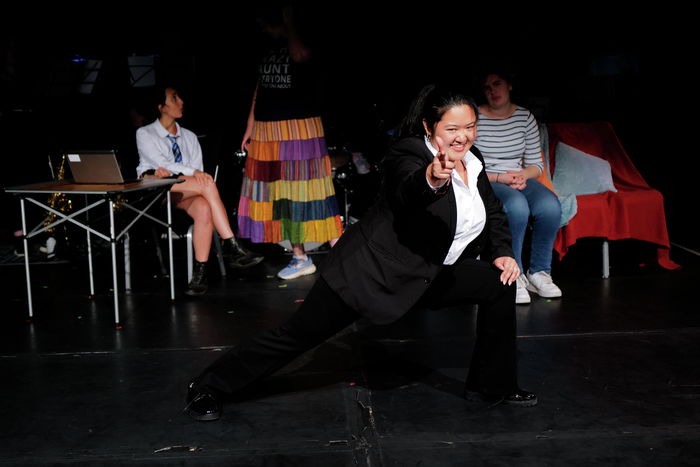The Merry Wives of Windsor plays it safe
This Cambridge Shakespeare Festival production delivers exactly what you would expect, but does it pretty well

This year’s Cambridge Shakespeare Festival (CSF) production of The Merry Wives of Windsor is a quintessential example of that most English tradition, the outdoor Shakespeare. It ticks all the boxes: beautiful garden setting, picnics galore, colourful (vaguely) period costumes. As usual, there’s a bit of cheeky innuendo integrated into what is ultimately a family friendly show, with chuckles garnered for the actors’ knowing interactions with the starry-eyed kids at the front. It’s the kind of production that many of us raised middle-class are familiar with, from trips to a local outdoor amphitheatre as a kid, pilgrimages to the Globe in London, and now of course May Week productions here in Cambridge. Yet I found at this show it was particularly hard not to notice the Camembert cheese being tucked into behind me, the Prosecco being passed down a row of chairs in plastic M&S flutes, the mulled wine being served at the interval. One becomes uncomfortably aware of how the whole ritual embodies middle-class comfort and satisfaction with an almost hilarious lack of subtlety.
“For those of us that the social order suits, then, this is ideal entertainment”
I begin with these observations not because I believe this is inherently bad, but in acknowledgement that the surrounding tradition undeniably contextualises and shapes the theatre itself. Inherent to the atmosphere of comfort is a (small c) conservative attitude of contentment with the status quo, which is directly reflected in the plays’ dramaturgy and the performances themselves. Shakespeare’s comedies perfectly suit this environment because – apart from the underlying national pride in this titan of anglophone literature – they all, by definition, end with one or more happy marriages: all is well, happy ever after.
In the most commonly performed summer plays, such as Much Ado about Nothing, Midsummer Night’s Dream, Twelfth Night, and Merry Wives of Windsor, the threats to the status quo that drive the story forwards are barely threats at all, but rather a series of contrived plots and foibles to put the characters in comic situations. For those of us that the social order suits, then, this is ideal entertainment.
The CSF production in question obviously derived itself from the outdoor Shakespeare tradition (itself drawn from the plays’ unchallenging dramaturgies). The beautiful Fellow’s Garden at John’s was well utilised, with simple but effective staging centred around a lovely old tree. The melody of ‘Greensleeves’, reputedly (but not actually) composed by Henry VIII, returned throughout, contributing to the evocation of quintessential Englishness. A jazzy rearrangement of the tune at the end, replete with a slightly miscoordinated click, tipped into kitschy, especially with the audience’s unwillingness to join in.
This kind of failed quirkiness is a downfall of theatre aiming to draw contented chuckles from its audience rather than challenge or critically engage them in any way. Similarly, the flirtatious and innuendo-laden overacting, particularly from Mistress Ford, produced some funny moments but at times felt distasteful, like it was just there to amuse those not following along with the Shakespearean dialogue.
“It’s a cute date, a good evening for a summer holiday, a safe family activity”
Credit where it is due, there was definitely quality on display. Falstaff (thankfully) was particularly fun, drawing laughs without trying as obviously hard as some of the rest of the cast. The direction was also strong, demonstrating experience with the unique challenges of outdoor theatre and bringing some original ideas to the show. Particularly funny were the workmen servants of Mistress Page casually eating their packed lunch whilst the slapstick chaos of Page’s hunt for Falstaff played out around them. The costumes for the Act Five forest scene were also brilliant, with little puppets attached to the chests of plain black underclothes, giving the effect of floating fairies with comically large human heads.
The overwhelming impression wasn’t of striking originality, though, but a reliable delivery of what you’d expect when you buy a ticket for a garden Shakespeare. Solid acting, cheeky slapstick comedy, folksy music, a bit of audience interaction, characterful costuming, pretty setting. It’s a cute date, a good evening for a summer holiday, a safe family activity. The production is the result of a tradition that has perfected itself and therefore stopped evolving. The show could have existed practically unchanged 80 years ago and thus acts as a bubble for audiences to forget about the turbulent contemporary world and enjoy a fantasy world of inoffensive whimsy.
The potential threats and challenges of the script, like Falstaff’s arguably leering and predatory behaviour, and the violence of Ford against who he thinks is his wife’s aunt, are smoothed over with a pantomime sensibility of exaggeration and buffoonery. Realistically, it can’t be any other way: audiences sipping their bubbly and cuddling their children don’t want to be made uncomfortable. As the world evolves, however, these antiquated traditions jar ever more. For a bit of light fun, then, this is a strong and enjoyable production; for thought-provoking, progressive, and engaged theatre, you’re looking in the wrong place.
 Features / Should I stay or should I go? Cambridge students and alumni reflect on how their memories stay with them15 December 2025
Features / Should I stay or should I go? Cambridge students and alumni reflect on how their memories stay with them15 December 2025 News / SU reluctantly registers controversial women’s soc18 December 2025
News / SU reluctantly registers controversial women’s soc18 December 2025 News / Dons warn PM about Vet School closure16 December 2025
News / Dons warn PM about Vet School closure16 December 2025 News / Cambridge study finds students learn better with notes than AI13 December 2025
News / Cambridge study finds students learn better with notes than AI13 December 2025 Comment / The magic of an eight-week term15 December 2025
Comment / The magic of an eight-week term15 December 2025









